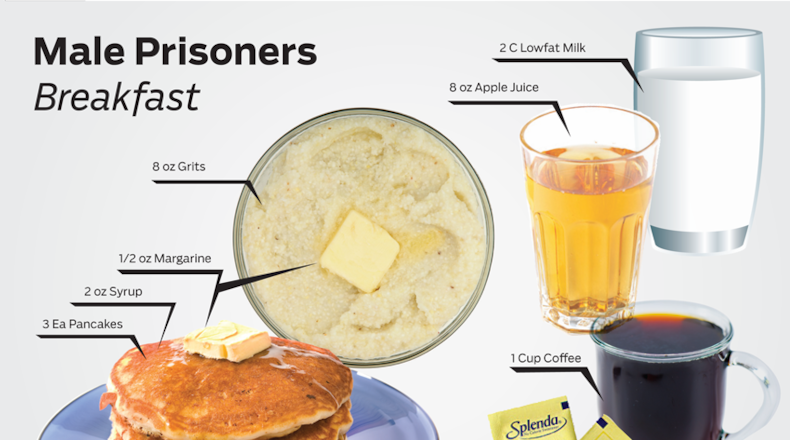The average cost per inmate meal:
2005: $1.54
2006: $1.54
2007: $1.49
2008: $1.52
2009: $1.73
2010: $1.63
Dec 2012: $1.58
Source: Correctional Institution Inspection Committee; Ohio Department of Rehabilitation and Correction
Five-year average cost per meal for food only, 2005 to 2010:
Highest: $2.68 at the Corrections Medical Center
Lowest: 59 cents at Richland Correctional Institution
Average: $1
Source: Correctional Institution Inspection Committee
Ohio plans to hire a private vendor to feed 50,179 inmates in the state’s 32 adult and youth prisons, a move that the Kasich Administration expects will save taxpayers $16 million a year but that state prison workers say could lead to lost jobs and inmate unrest.
Feeding adult inmates now costs the state $1.58 per meal, which adds up to about $79 million per year. Department of Rehabilitation and Correction officials estimate that a private vendor can shave 19 percent off the food budget and they note that Indiana’s prison food contractor charges $1.19 per meal.
“We believe outsourcing could result in a dollar amount in the same ballpark of what Indiana is seeing for food service, but we won’t know for certain until we receive responses to the RFP,” said prisons spokeswoman JoEllen Smith, referring to the request for proposals that were issued Friday.
The state Department of Youth Services, which has 469 youths at four detention facilities, spends $6.18 million a year, or $27.60 per inmate per day for food service, said spokeswoman Kim Parsell. The costs are higher because youths don’t help with food prep or cooking, the meals adhere to federal guidelines for school lunches and the teen-aged detainees have higher caloric needs, she said. The state receives $5.51 per day per youth as reimbursement from the national school lunch program.
Switching to a private vendor is expected to save DYS about $1.2 million a year, she said.
The Ohio Civil Service Employees Association, the union that represents some 10,000 prison workers, warns that a contractor will pay lower wages, hire fewer people and dish out less food to make a profit. Roughly, 450 state workers in DYS and DRC could end up losing their jobs, though some could apply for other state jobs or perhaps be hired by the contractor.
Tim Shafer, OCSEA operations director, said complaints about inmate food may sound like whining but they contribute to the safety and security of a prison.
“As a former corrections officer, I can tell you one of the best things in the world is a full inmate. They want to sit down and chill out,” Shafer said.
Inmates are fed a heart healthy diet that features a rotating menu of dinners such as sloppy joes, fajitas, and chicken and biscuits.
In November 1998, Ohio hired Aramark to feed prisoners at Noble and Belmont correctional institutions. The two-year contract called for the firm to be paid based on actual meals served, but three months into the deal it was verbally amended to pay Aramark based on the average daily inmate count at the prisons, which drove up costs by more than $2 million, according to an audit by then-state Auditor Jim Petro.
“The whole thing was a big fraud and it created such havoc inside the institutions because the inmates weren’t fed properly,” Shafer said.
The Correctional Institution Inspection Committee said in a recent report that other states have privatized prison food with mixed results. The bipartisan committee recommended that if Ohio goes this route, it should hire a vendor with a proven track record and make sure there is strong contract monitoring in place.
Indiana, Kentucky and Florida are among the states that have used private contractors. Florida ended the contract after running into trouble while Kentucky’s state auditor issued a report in October 2010 that said officials were unable to verify that Aramark followed state-approved recipes, used proper quality ingredients or met food safety standards and auditors found contract violations that led to cost overruns.
Michigan Department of Corrections is currently evaluating food service proposals from two bidders to see if it can cut costs and improve operations. Michigan spends $4.63 per day to serve three meals to 43,300 inmates, said Brad Purves, food service program manager. He noted that 17 percent of state prison systems in the U.S. use private contractors for food service.
As it is, inmates aren’t too happy with Ohio prison food. Complaints include portion sizes, taste and temperature, according to the CIIC.
About the Author

